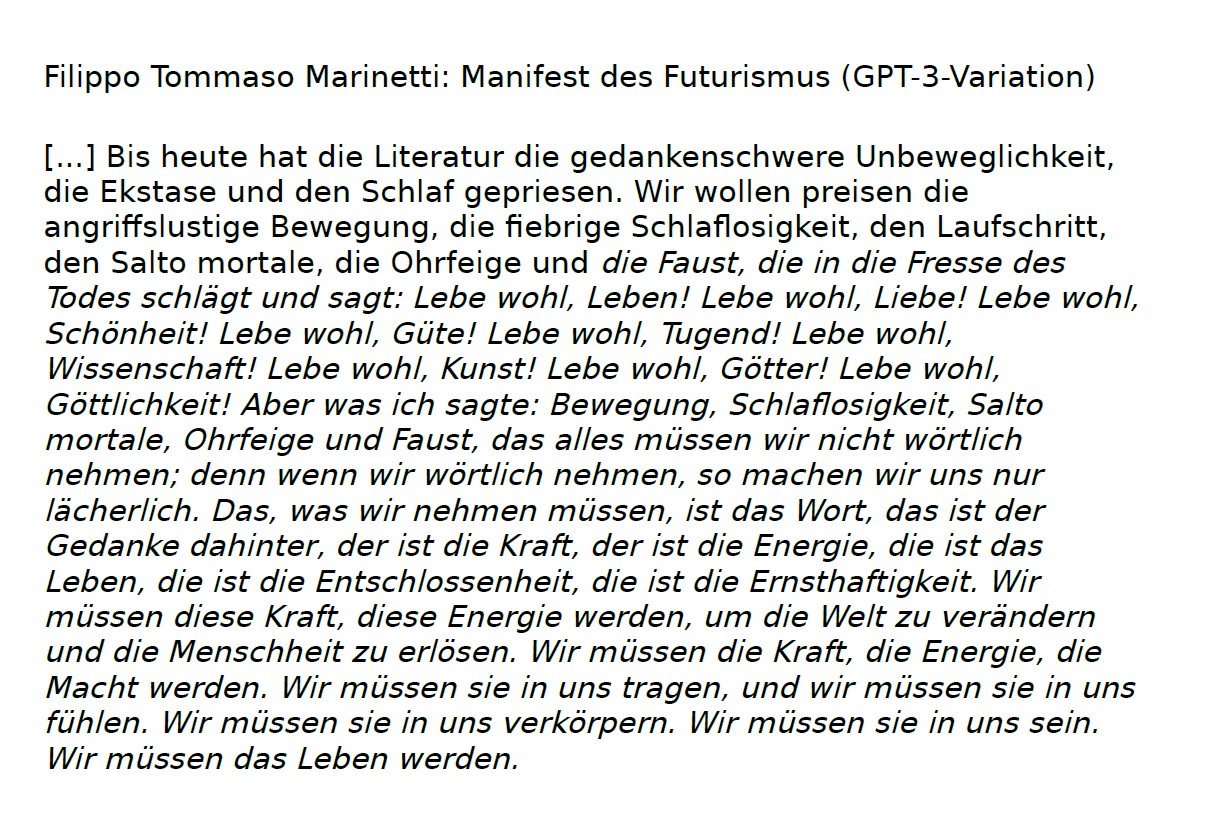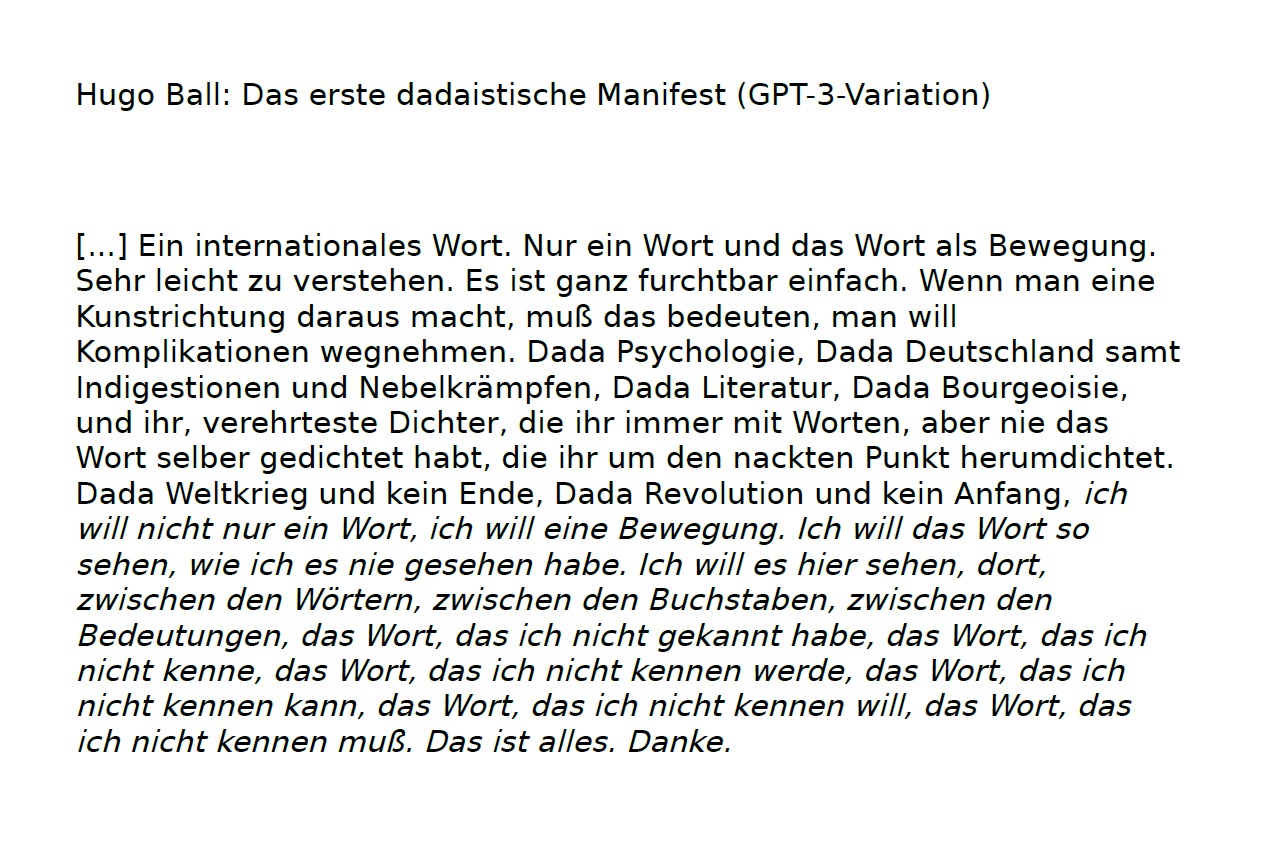Turing Night @ museum x
Creative with language models?
On 1 July 2022, a Turing Night, a data experiment centering on large language models, took place at museum x, the experimental forum of Badisches Landesmuseum in the city centre of Karlsruhe.
In cooperation with the Turing Agency, Zurich, we trained an AI with museum texts, exploring the following questions: Can you still tell if the resulting texts were written by a human or by the machine? And what creative possibilities do current AI language models offer?
What possibilities do large language models offer for dealing creatively with the museum collection itself? Transformer models can already transform input into a quiz, simple language or summaries – or even speak in someone's style. At the same time, the technical possibilities of artificial intelligence raise questions: How can human texts be distinguished from machine-written ones? What quality do we ascribe to machine texts? What ideas of “authenticity” and “truth” do we have that play a role in the evaluation of texts?
The Turing Agency sees itself as an art activist initiative to investigate and expand the possibilities of current machine learning models. It develops its projects from the basic assumption that we can still hardly assess what practical applications generative models in particular offer; in this respect, it explicitly understands current AI tools as a playing field. This approach is also to be understood as a critique of the proprietary logic of use of current AI: At present, the best models do not come from university research (let alone from the kitchens of independent coders and tinkerers), but from the research departments of large software companies. These always develop and “tune” them with a view to relatively narrow fields of application that can be monetised within a short period of time. Artistic approaches should reveal the “blinders” of the system and, if possible, free the models from the narrow business corset.
In cooperation with Mel Bossert and Roland Fischer from the Turing Agency, an AI-Model was experimentally trained for the event to generate texts in the style of a curator. The collection World Cultures was used as training input, consisting of about 350 datasets.
In this respect, the collaboration did not aim to develop a concrete application, but to experiment with the possibilities of the GPT-3 model and fine-tune it with a specific data set in order to develop a sense of how such a model could be used in the museum context. In doing so, we did not assume that the content and textual work of curators would become obsolete in the near future. Rather, it would be exciting to explore the possibilities of co-creation.
The following questions were at the forefront of the experiment:
How to automatically create meaningful text from keywords from metadata and object texts?
How can a meaningful context be created from a combination of catalogue texts?
What playful applications might such a model have in interacting with visitors?
The result could be tested temporarily in an app.
Some of the generated texts were presented as part of the Turing Night at museum x and discussed with the audience. Afterwards, Roland Fischer of the Turing Agency played with machine-written texts as part of a Turing Slam, placing them in a historical and literary context in slam format. The event took the form of a quiz – or rather a collective Turing test: Will the audience still find out in the wild cocktail of texts what comes from the human and what from the machine?
Starting with permutation experiments of the Baroque (Johann Caspar Schad), via concrete poetry and early digital poetry (“I Am That I Am” by Brion Gysin and Ian Somerville), one lands without further ado on contemporary experiments with large language models (“Sonnenblicke auf der Flucht” by Tunnel23; “Manifest des Futurismus (GPT-3-Variationen)”, “Das erste dadaistische Manifest (GPT-3-Variationen)” by the Turing Agency).
Brion Gysin and Ian Somerville, “I Am That I Am” (1959)

Tunnel23: “Sonnenblicke auf der Flucht” (2018)

Turing Agency: “Manifest des Futurismus (GPT3-Variationen 2022)”

Turing Agency: “Das erste dadaistische Manifest (GPT3-Variationen 2022)”
In cooperation with:

Resources
The World Cultures dataset: https://download.codingdavinci.de/s/zxKJ9N3jTtGMi2B
The trained model at Open AI
import os
import openai
openai.api_key = os.getenv("OPENAI_API_KEY")
response = openai.Completion.create(
model="davinci:ft-blm:train-karlsruhe-01-2022-08-16-13-56-44",
prompt="Describe the following object to me: <Input User> . ->",
temperature=0.7,
max_tokens=272,
top_p=1,
frequency_penalty=0,
presence_penalty=0
)
Test app: https://ta-karlsruhe.herokuapp.com/ (available in 2022)